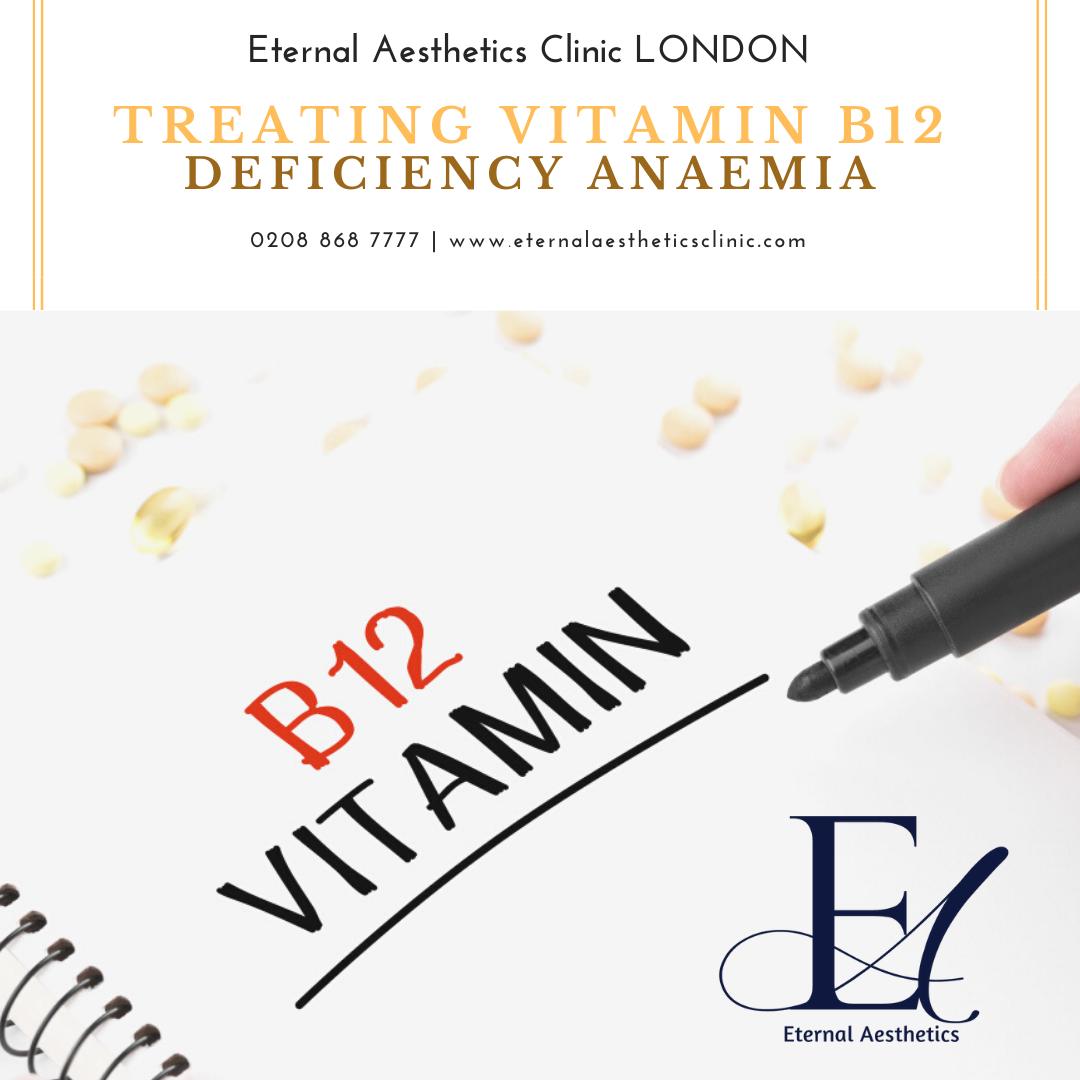Vitamin B12
Folate Deficiency Anaemia
Vitamin B12 or B9 (commonly called folate) deficiency anaemia occurs when a lack of vitamin B12 or folate causes the body to produce abnormally large red blood cells that cannot function properly.
Red blood cells carry oxygen around the body using a substance called haemoglobin.
Anaemia is the general term for having either fewer red blood cells than normal or having an abnormally low amount of haemoglobin in each red blood cell.
There are several different types of anaemia and each one has a different cause.
For example, iron deficiency anaemia happens when the body does not contain enough iron.
Vitamin B12 and folate perform several important functions in the body, including keeping the nervous system healthy.
A deficiency in either of these vitamins can cause a wide range of problems, including:
- extreme tiredness
- a lack of energy
- pins and needles (paraesthesia)
- a sore and red tongue
- mouth ulcers
- muscle weakness
- disturbed vision
- psychological problems, which may include depression and confusion
- problems with memory, understanding and judgement
Some of these problems can also happen if you have a deficiency in vitamin B12 or folate but do not have anaemia.
See a GP if you think you may have a vitamin B12 or folate deficiency.
These conditions can often be diagnosed based on your symptoms and the results of a blood test.
It’s important for vitamin B12 or folate deficiency anaemia to be diagnosed and treated as soon as possible.
This is because although many of the symptoms improve with treatment, some problems caused by the condition can be irreversible.
There are a number of problems that can lead to a vitamin B12 or folate deficiency.
These include:
- pernicious anaemia – where your immune system attacks healthy cells in your stomach, preventing your body absorbing vitamin B12 from the food you eat; this is the most common cause of vitamin B12 deficiency in the UK
- a lack of these vitamins in your diet – this is uncommon, but can happen if you have a vegan diet and do not take vitamin B12 supplements or eat foods fortified with vitamin B12 , follow a fad diet or have a generally poor diet for a long time
- medicine – certain medicines, including anticonvulsants and proton pump inhibitors (PPIs), can affect how much of these vitamins your body absorbs
Both vitamin B12 deficiency and folate deficiency are more common in older people, affecting around 1 in 10 people aged 75 or over and 1 in 20 people aged 65 to 74.
Most cases of vitamin B12 and folate deficiency can be easily treated with injections or tablets to replace the missing vitamins.
Vitamin B12 supplements are usually given by injection at first.
Then, depending on whether your B12 deficiency is related to your diet, you’ll either require B12 tablets between meals or regular injections.
These treatments may be needed for the rest of your life.
Folic acid tablets are used to restore folate levels. These usually need to be taken for 4 months.
In some cases, improving your diet can help treat the condition and prevent it coming back.
Vitamin B12 is found in meat, fish, eggs, dairy products, yeast extract (such as Marmite) and specially fortified foods.
The best sources of folate include green vegetables, such as broccoli, brussels sprouts and peas.
The treatment for vitamin B12 or folate deficiency anaemia depends on what’s causing the condition. Most people can be easily treated with injections or tablets to replace the missing vitamins.
Vitamin B12 deficiency anaemia is usually treated with injections of vitamin B12.
There are 2 types of vitamin B12 injections:
- hydroxocobalamin
- cyanocobalamin
Hydroxocobalamin is usually the recommended option as it stays in the body for longer.
At first, you’ll have these injections every other day for 2 weeks or until your symptoms have started improving.
Your GP or nurse will give the injections.
After this initial period, your treatment will depend on whether the cause of your vitamin B12 deficiency is related to your diet or whether the deficiency is causing any neurological problems, such as problems with thinking, memory and behaviour.
The most common cause of vitamin B12 deficiency in the UK is pernicious anaemia, which is not related to your diet.
If your vitamin B12 deficiency is caused by a lack of the vitamin in your diet, you may be prescribed vitamin B12 tablets to take every day between meals.
Or you may need to have an injection of hydroxocobalamin twice a year.
People who find it difficult to get enough vitamin B12 in their diets, such as those following a vegan diet, may need vitamin B12 tablets for life.
Although it’s less common, people with vitamin B12 deficiency caused by a prolonged poor diet may be advised to stop taking the tablets once their vitamin B12 levels have returned to normal and their diet has improved.
Good sources of vitamin B12 include:
- meat
- salmon and cod
- milk and other dairy products
- eggs
If you’re a vegetarian or vegan, or are looking for alternatives to meat and dairy products, there are other foods that contain vitamin B12, such as yeast extract (including Marmite), as well as some fortified breakfast cereals and soy products.
Check the nutrition labels while food shopping to see how much vitamin B12 different foods contain.
If your vitamin B12 deficiency is not caused by a lack of vitamin B12 in your diet, you’ll usually need to have an injection of hydroxocobalamin every 2 to 3 months for the rest of your life.
If you have had neurological symptoms that affect your nervous system, such as numbness or tingling in your hands and feet, caused by a vitamin B12 deficiency, you’ll be referred to a haematologist and may need to have injections every 2 months.
Your haematologist will advise on how long you need to keep taking the injections.
For injections of vitamin B12 given in the UK, hydroxocobalamin is preferred to an alternative called cyanocobalamin. This is because hydroxocobalamin stays in the body for longer.
If you need regular injections of vitamin B12, cyanocobalamin would need to be given once a month, whereas hydroxocobalamin can be given every 3 months.
Cyanocobalamin injections are not routinely available on the NHS as hydroxocobalamin is the preferred treatment.
But if you need replacement tablets of vitamin B12, these will usually be in the form of cyanocobalamin.
To treat folate deficiency anaemia, your GP will usually prescribe daily folic acid tablets to build up your folate levels.
They may also give you dietary advice so you can increase your folate intake.
Good sources of folate include:
- broccoli
- brussels sprouts
- asparagus
- peas
- chickpeas
- brown rice
Most people need to take folic acid tablets for about 4 months. But if the underlying cause of your folate deficiency anaemia continues, you may have to take folic acid tablets for longer, possibly for life.
Before you start taking folic acid, your GP will check your vitamin B12 levels to make sure they’re normal.
This is because folic acid treatment can sometimes improve your symptoms so much that it masks an underlying vitamin B12 deficiency.
If a vitamin B12 deficiency is not detected and treated, it could affect your nervous system.
Vitamin B12
Suggested treatment protocol:
2-3 injections/week for two weeks and 1 injection every 2-3 months afterwards
-
1 injection Now £40
-
2 injections Now £70
-
3 injections Now £100
CONTACT FORM
For this procedure please review our prices and
Eternal Aesthetics Clinic
Price List
Treatment Protocol For Vitamin B12
Suggested treatment:
2/3 injections for two weeks and 1 injection every 2/3 months afterwards
*** Prices are inclusive of VAT and a 3D Consultation ***
*** A stand alone Consultation is £30 ***
*** The Booking Deposit of £30 is refundable when your appointment is honoured and treatment proceeded with ***
Eternal Aesthetics reserves the right to retain the deposit for no show, lateness more than 15 min , cancellations within 24 hours or in the instance of not going through with the treatment after the consultation was provided.


